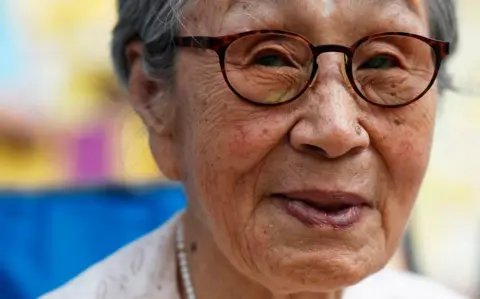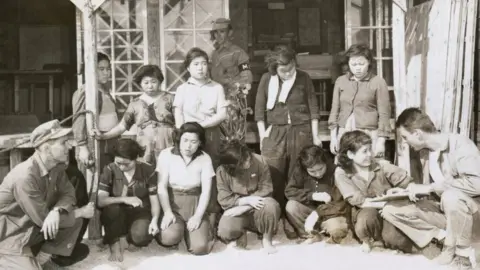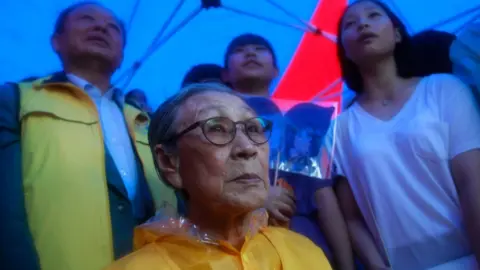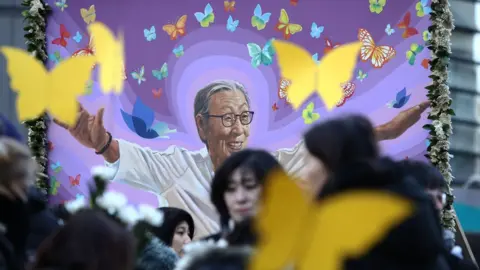Obituary: Kim Bok-dong, the South Korean 'comfort woman'
 Getty Images
Getty ImagesThe coffin passed the Japanese embassy in Seoul, accompanied on its final journey by mourners waving banners and holding yellow butterflies.
Cries of "Japan must apologise" rang out above the crowd, while others quietly sobbed.
It was not your usual funeral procession. But then, Kim Bok-dong was not your usual woman, and this was her final act of resistance against a country which had stolen so much from her.
Kim was one of thousands of so-called "comfort women" rounded up by the Japanese army and forced to work as sex slaves for years on end.
She died on Monday, at the age of 92, without ever receiving the apology she wanted; still railing against the injustice; still angry with Japan for taking the life she could and should have had.
"I was born a woman," she said, "but I never lived as a woman."
'I had to comply'
It took Kim Bok-dong almost 40 years to find the strength to tell her story.
She was just 14 when the Japanese soldiers arrived at her family's home in Yangsan, South Gyeongsang. They said she was needed to work in a factory. If she did not come, they warned her mother, the family would suffer.
But Kim was not taken to work in a factory. Instead, the teenager found herself transported to one of hundreds of "comfort stations" set up by the Japanese Imperial Army across the territory it had seized.
These "stations" were, in reality, brothels where some estimate as many as 200,000 women were forced to work as sex slaves.
Kim, who should still have been in school, was among them.
Her young age did not go unnoticed after she arrived in China.
"When they found out I was only 14, they talked among themselves saying 'Isn't she too young?'," she told YouTube channel Asian Boss during an interview in October 2018.
Apparently, it was not a problem. She was sent to start work.
"The first time, I got dragged into one of the rooms and beaten up a bit," she recalled. "So I had to comply."
Afterwards, she said, the bed sheets were covered in blood. It was too much to bear, and she decided there was only one way out.
 Mary Evans Picture Library
Mary Evans Picture LibraryUsing the little money she had been given by her mother, she and two others convinced a cleaner to buy them a bottle of the strongest alcohol they could find.
They drank until they passed out, but it wasn't enough. The three girls were found, and their stomachs were pumped.
When Kim finally woke up, she made a choice - no matter what happened, she would live to tell the tale.
'How could I tell anyone?'
The Japanese Imperial Army first introduced the idea of "comfort stations" in the early 1930s. It was supposed to stop their soldiers going on "raping sprees", and keep them free of sexually transmitted diseases.
In the beginning, it is thought they used prostitutes. But as Japan's military grew, so did demand. Eventually, they turned to slavery.
The men, Kim Bok-dong later recalled, would line up outside, waiting their turn.


Weekends were particularly dreadful. On Saturdays, she would work for six hours, the men arriving one after the other. On Sundays, it was nine hours.
Sometimes she would see almost 50 men in a day. Some days, she lost count. By the time her "shift" ended, she could barely stand up or walk.
Kim was moved from station to station, and in 1945 she found herself in Singapore. The Japanese began to move Kim and the other comfort women out of the brothels. Kim found herself working as a nurse, still waiting for rescue.
 Getty Images
Getty ImagesIt was 1947 when she was finally brought home to South Korea. She didn't know how long she had been gone; she also didn't know how to find the words to explain what had happened to her.
"How could I have told them about my experiences?" she asked. "I had things done to me that were unfathomable."
She wasn't alone in her silence, as the University of Connecticut's Alexis Dudden explains.
"I think her history following her return to Korea is a really good explanation of the double victimisation of those who survived," the history professor said. "There was not space in this society for the women to go public."

More lives in profile:

Kim did find her voice though, a few years after her return. Her mother wanted her to marry, and she felt she had to explain why she would not.
"I confessed that, given all the abuse done to my body, I didn't want to screw up another man's life," she told Asian Boss.
Her mother, she said, became distressed. Unable to share her daughter's secret, she died shortly afterwards of a heart attack. Kim believed it was the pain of the secret which killed her.
'It's not about money'
It would take decades for Kim Bok-dong to talk again about what happened to her. She moved to Busan, where she ran a successful fish restaurant.
And then Kim Hak-sun came forward, sharing her own story of being imprisoned as a "comfort woman" by the Japanese in China - the first South Korean victim to break her silence so publicly. It was 1991. By March 1992, Kim Bok-dong had come forward to tell the world her account.
"She had incredible strength - she was a survivor," says Prof Dudden, who first met her more than two decades ago. "She came forward to tell her truth. That is when she makes her mark on the page."
Her story would not just impact her fellow survivors in South Korea, though. It would bring together survivors from around the world - including women in Vietnam who had been attacked by South Korean soldiers during the US war. In 2014, she set up The Butterfly Fund to support fellow victims.
"The survivors of sexual violence in conflict from the Democratic Republic of the Congo and Uganda, address Kim Bok-dong... as 'our hero', 'our mama', and 'our hope'," a spokesman for The Korean Council for Justice and Remembrance for the Issues of Military Sexual Slavery by Japan recalls.
 Getty Images
Getty ImagesKim did not just share her story. When she had money, she gave it. In 2015, she started a scholarship for children in conflict regions with her own money. The fact her own education had been cut so short was a regret until the end of her life. When it became clear she was dying of cancer in 2018, she began to give away what little money remained.
But through all this - speaking around the world, campaigning outside the Japanese embassy every Wednesday - she still did not get the apology she felt she and the other victims deserved.
She was derisive of the 2015 deal between the Japanese and South Korea, which saw her former captors pay 1bn yen ($8.3m, £5.6m) to fund victims.
What Kim wanted - what she was fighting for - was a full admission of guilt. Some still allege the women were not forced to work in the stations.
"We won't accept it even if Japan gives 10bn yen. It's not about money. They're still saying we went there because we wanted to," Kim told lawmakers in 2016.
South Korea's President Moon Jae-In has since said he will renegotiate the fund, focusing more on the victims.
But it came too late for Kim. As she lay taking her final breaths, she expressed "strong anger" towards Japan, her friend Yoon Mee-Hyang told reporters. As Prof Dudden puts it, she "died screaming".
But her legacy will not be lost. In among the crowd at her funeral was Kim Sam, 27, who first met Kim "sitting up straight even in the rain as she spoke about her struggle".
"Upright, dignified - that's how she always was, first as a victim and later as a human rights activist," she recalled.
"She's a role model I respect the most."
